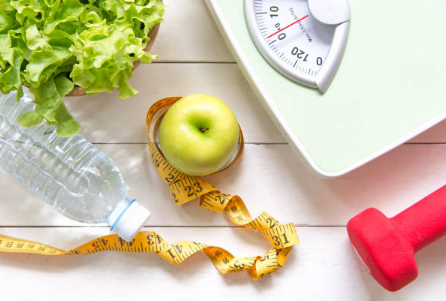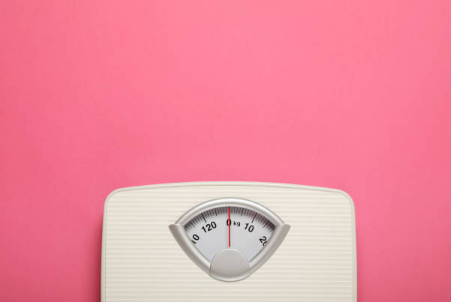If you’re on a weight loss journey, you may be wondering how to predict how long it will take to reach your goal. In general, there is no way to accurately predict how long it will take to lose weight. There are a lot of factors that affect the time it takes to lose weight. A major factor is your weight loss goals.
Here are some insights into how weight loss works, and why predicting how quickly it will take to lose weight can be tricky.

It Is Recommended to Lose One to Two Pounds per Week
The Centers for Disease Control and Prevention (CDC) says people who lose weight gradually and steadily (about one to two pounds per week) are more likely to maintain their weight.
The rate at which you lose weight can also predict the type of weight you lose. Rapid weight loss is defined as losing more than two pounds per week for several weeks in a row. Gradual weight loss has been shown to reduce more pounds of total fat and lower body fat percentage (the ratio of body fat weight to lean body mass) compared to rapid weight loss.
While many people want to lose weight faster, even modest weight loss (5-10% of total body weight) has been shown to have health benefits, including improved blood pressure, blood cholesterol, and blood sugar.
If You Start with a Higher Weight, You May Lose Weight Faster
For many people, losing one to two pounds a week is reasonable – no extreme diet or exercise habits are required. That said, if you have more weight to lose, you may lose it faster, as changing your diet may lead to a larger calorie deficit.
For example, according to a weight planner at the National Institute of Diabetes, Digestive and Kidney Diseases (NIDDK), a 40-year-old woman who is 5’4″ tall, weighs 200 pounds, and has a light activity level needs to eat 2,190 calories per day to maintain her weight. In contrast, a woman of the same age, height, and activity level who weighs 150 pounds needs to eat 1,873 calories to maintain her weight. If they both start eating 1,500 calories per day, then a woman who weighs 200 pounds will lose more calories per day.
A 2021 study concluded that while there is no single optimal weight management strategy, energy or calorie deficiencies are the most important factors in weight loss.
But when you lose weight, the deficit shrinks, which is why the closer you get to your weight goal, the slower you lose weight, no matter where you start. The last 10 pounds will be more stubborn than the 50 pounds that seem to disappear. To lose those 10 pounds, try reducing your calorie intake or increasing your workout time or intensity.
Changing the Type of Calories You Eat May Accelerate Weight Loss
While calories are important, the quality, balance, and timing of calorie intake also play a key role in the weight loss process.
Simply reducing your calorie intake while still consuming a lot of processed foods, or eating a lot of calories at night, may not lose weight quickly. The following three studies help to illustrate these facts.
A 2017 study found that replacing refined grains with whole grains for six weeks in men and postmenopausal women resulted in a higher resting metabolic rate (more calories burned).

Another study found that in postmenopausal people, even those who consumed the recommended amount of protein experienced the greatest benefits in terms of metabolism and insulin sensitivity (the effect of insulin in regulating blood sugar) compared to those who followed a high-protein diet.
A 2020 study found that eating dinner worsened blood sugar tolerance and reduced the amount of fat burned. However, these effects depend on when a person sleeps, sleep quality, diet, and more.
Consuming Too Few Calories Can Hinder Weight Loss
If you want to eat as few calories as possible, consult your personal healthcare provider.
In a 2021 study, 108 adults who were overweight or obese were randomly assigned to receive a very low-calorie diet (VLCD) that provided 600-700 calories per day and different protein levels (52 grams or 77 grams per day) for eight weeks.
While both VLCDs reduce body weight and fat mass, researchers have found that high-protein diets do not prevent the loss of lean mass such as muscle or a decrease in resting metabolic rate (i.e., the number of calories burned at rest).
The National Health Service (NHS), which provides publicly funded healthcare services in the UK, also states that the nutritional profile of VLCD may be less complete, not suitable for most people, and may cause side effects such as hunger, low energy, etc. , headaches, dizziness, cramps, and thinning hair.
It may sound counterintuitive, but having too few calories can actually hinder your weight loss efforts, and when your body doesn’t get enough energy to fuel itself, it goes into starvation mode and starts retaining every calorie.
It is also important to be aware that restrictive diets can increase the risk of eating disorders. If you’re looking to reduce your calorie intake, it may be a good idea to work with your healthcare provider, such as a dietitian or dietitian.
Genetics and Other Factors May Affect Your Weight Loss Rate
Metabolism, which is basically the way the body burns calories, is an important and complex factor in the weight loss puzzle. Appetite regulating hormones also play a role in weight loss. Both can be influenced by factors such as poor sleep, stress, and the composition of the gut microbiome (a collection of microorganisms in the digestive system).
Studies have shown that the gut microbiota can actually affect both sides of the caloric balance equation. It affects how we utilize the calories in the food we eat, and how we burn or store them.
So losing weight – and how quickly you lose it – isn’t that simple.
Weight Fluctuations Are Normal
It’s also important to know that weight loss isn’t always linear. It’s normal for your weight to change every day or even hour. When you’re standing on a scale, you’re measuring everything that has weight:
- Your muscles
- Bone
- Body fat
- The amount of water changes rapidly and dramatically
- Undigested food, even if it is all burned later
- Waste products from the gastrointestinal tract that have not been eliminated by the body

If water retention is due to PMS, extra salty foods, medications, or other reasons, then the weight on the scale will be higher, even if you lose body fat at the same time.
Weight loss is rarely linear, so don’t be discouraged if you see you gain a few pounds. If you’re doing strength training (which is recommended because muscles help burn more calories), you may see your scale go up if you gain muscle mass. Don’t pay too much attention to the numbers on the scale, but measure how you feel in your clothes.
Be Patient
Pursuing weight loss may not always be an easy decision, but that doesn’t mean you have to start. You can get started using the following steps from the CDC:
- Commit yourself to losing weight
- Determine your starting point based on height, weight, risk factors, diet, and lifestyle
- Set specific, realistic goals that leave room for forgiveness
- Find ways to educate and support yourself
- Monitor and reward your progress over time
Everyone wants to solve problems quickly, but unfortunately, when it comes to weight loss, a slow and steady approach is the victory. Quick fixes are often the result of a fad diet, which is not sustainable in the long run. The best way to lose weight is to establish long-term healthy habits as part of your lifestyle and without taking drastic measures that will starve you or negatively affect your health.
Losing weight is complex, and no one can accurately predict how much weight you will lose in a given time frame. In fact, it’s even more important to focus on healthy, balanced habits that you can stick to.